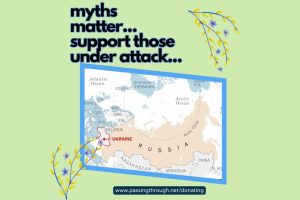In the heart of an Australian city, over the simplicity of a coffee, I found myself listening to a story that reshaped my understanding of resilience, war, and the human spirit. A tale of survival in Sumy, Ukraine. It was a tale not uncommon in its origin—stemming from the conflict in Ukraine—but profoundly unique in its personal touch. The person sharing it, a Ukrainian-Australian woman, brought the distant reality of war right to our table, making the global political turmoil acutely personal.
She was visiting her family in a rural village in Sumy Oblast, just a stone’s throw from the Russian border, when the Russian’s invaded Ukraine yet again on Feb 24, 2022. The idyllic life of living off the land she was contemplating returning to was shattered overnight. Encircled by Russian forces, her village became a no-man’s-land, spared entry not by mercy but by logistical challenges faced by the invaders. The situation was dire—drones destroyed agricultural lifelines, and the surrounding violence they were getting reports of from neighbours and friends severed any hope of normalcy or escape. In other villages they told her of soldiers killing many of the males, sexually assaulting the women and looting and destroying everything.
Her account detailed the unthinkable choices faced by those in occupied territories: stay and risk annihilation or flee and face uncertain dangers. Amidst the chaos, the betrayal by a local MP ( a Russian agent and now a fugitive in Russia,) who had been preparing the area for invasion for two decades, underscored the deep-seated treachery and the complicated weave of loyalty and dissent within the conflict.
Their village was ten kilometres from the border – some people suggested they run there and escape through Russia. Firstly they didn’t have enough fuel to do this. But then she also said to me “No way, the Russians will capture me and use me for propaganda. I would rather die right here!”
Miraculously, her area was later liberated, allowing her a path back to Australia. Yet, the ordeal followed her across continents. She perceives the shadow of Russian influence even here, through social media harassment and alleged control over certain economic sectors such as rental markets in affluent tourist areas controlled by Russian ‘mafia’. Despite these ongoing challenges, her resolve to support Ukraine remains unwavering—a testament to the strength drawn from her harrowing experiences.
Her story, shared across a café table, underscores a global conflict’s deeply personal impacts, reminding us that behind the headlines are individuals enduring, resisting, and surviving against unimaginable odds. It’s a narrative of resilience, a call to awareness, and a ray of hope for peace and justice.
Please make a tax-deductible donation to help those in desperate need. Regular giving, even if very small, is especially appreciated.





Love to hear your comments!